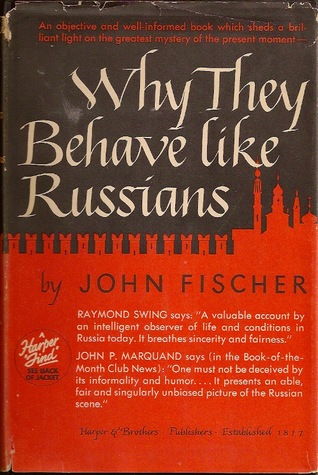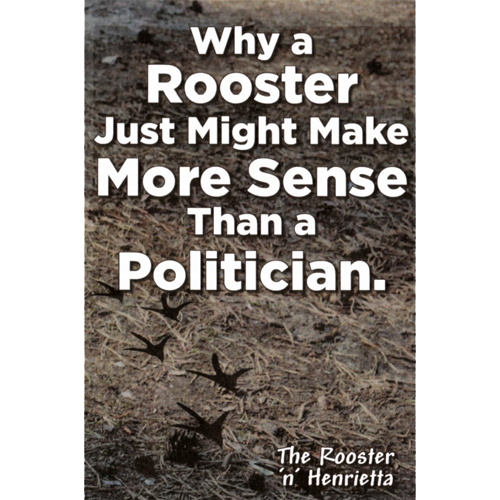“Why They Behave Like Russians” – A Book Review by Elizabeth Marshall
- 2015-10-01
- By admin
- Posted in Latest News

Elizabeth Marshall
Everyone who is concerned about where Ontario and Canada are headed should obtain a copy of this book. It to some may show the comparisons of Ontario’s 5 year plans to those of Stalin’s. It explains the schools of “trades” and, of course, now we have our College of Trades. Then there is the issue of removing the rural population to the urban centers, again this was done in Stalin’s Russia. This book is from the view of an American shortly after W.W.II who explains his opinion of Why They Behave Like Russians.
The Foreword of this book explains how John Fischer, the author, began his study of the Russia and the communist society at Oxford in 1933. From there he was with the Board of Economic Warfare during the war and his interest continued to grow. After the Second World War, in 1946, he spent 2 months with the United Nations Relief and Rehabilitation Administration (UNRRA) in the Ukraine and Russia to try and learn “what the Russians were up to,” because this would be the only way the Western countries could base any form of foreign policy.
Reading this book, I found myself doing a comparison to Ontario and Canada, of today. Fischer speaks of the Marxist theory that capitalism can “never escape from its fated cycle of booms and depressions, that each new depression is worse than the last, and that eventually the capitalist ruling class turns in desperation to fascism, imperialism, and aggressive war as the only way out of its economic troubles.”[1] He goes on to quote Stalin saying that the First World War was the first crisis of capitalism and the Second was caused by the second crisis. The Third War would be caused because economic circumstances could not be found through times of peace.
The first comparison comes into play when he begins to speak of the Kremlin deciding to implement their “five year plans.” Where have we heard this? We have been dealing with the Province creating “five year plans,” and “five year reviews” since 1946[2]. These events, in Canada, even caused concern for the Canadian Bar Association[3]. The plans consisted of moving people from the rural areas into the urban areas. This was because “neither the police nor Party can keep the thousands of scattered peasant villages under such tight control as they do the more compact population of the cities.“[4] And what do we have in reports today? From the report “Small, Rural and Remote Communities: An Anatomy of Risk:”
“5. At the same time, hard choices have to be made. The provincial government cannot provide subsidies to everyone everywhere in the province. Nor can all small communities survive, and provide a reasonable minimum level of services and jobs, within a climate of population and economic decline. The continuing experience of Newfoundland’s outports, in which numerous small and isolated communities have been shut down and their residents relocated, is a case in point.
- The province should also consider restricting further settlement expansion in the north by drawing firm lines indicating where it would and would not guarantee access to public services.
- One part of this settlement strategy will have to be devising innovative methods of “planning for downsizing” or, as defined above, planning for decline among existing communities, but done on a thoughtful and humane basis….
- To achieve economies of scale in service provision it will be necessary to concentrate growth and resources – not only private development but public investment in specialized (i.e. high-order) services – in designated urban growth centres. This will require a region-wide approach, involving local, regional, and provincial agencies and considerable inter-governmental cooperation. Deciding on where to concentrate such services also requires a settlement strategy that incorporates both the designation of growth centres and community downsizing. The Nordic countries (especially Sweden, Finland, Norway) have been able to build and maintain viable cities in remote regions by concentrating public resources, including government and public sector employment, while also relocating populations from less viable regions. In most instances, such policy initiatives have incorporated relocation grants to assist in the cost of moving and in securing housing and jobs in the new locations.”[5]
Then there are the “ride-programs”, the “carding”, Bill C-51, etc. You may be wonder why I am bringing that into the discussion? Under the Communist regime, John Fischer states:
“…the police machine has enjoyed great power. It holds, quite literally, the power of life and death over anyone in Russia except Stalin himself. It can demand access at all times to files, safes, letters, bedrooms, and kitchen cupboards, with no nonsense about privacy. Its dossiers record the most intimate details of the lives of everybody of any consequence in the Soviet Union and of thousands of unsuspecting people abroad.”[6]
He goes on to explain that, like any and all bureaucracies, they will not give up power easily. After the Second World War, the “police bureaucracy had two choices,” take off their uniforms and go back to what they had been before; giving up their power and privilege or create a new threat. In comparison today, we now have terrorism, ISIL/ISIS, and everyone is to be investigated, on a whim. We also have FINTRAC which makes banks, real estate agents, accountants, home builders, and who knows who else into private police “spies” and conspirators against the people. The innocent are being criminalized to create jobs. Small business owner’s having accounts frozen for depositing $500.00 cash, home-buyers having accounts frozen because they bought a house from a friend. Those are merely 2 instances from the Privacy Commissioner’s report on FINTRAC.
Then there is the College of Trades and post-secondary education. Free enterprise was allowed, in Communist Russia, except for one glitch; you couldn’t hire anyone. If you hired someone you were considered as “exploiting” them. State run schools of trade were the norm and were called “trade schools.” Some of the students voluntarily went, but most were chosen by government officials for apprenticeships. They were trained, in some factory or workshop for 4 hours a day and then had 4 hours of vocational education. It didn’t matter the educational value of their work because during training they just did the same thing over and over again. As for post-secondary education, you had to be a member of the “Party” to attend university or obtain a technical degree for that you could advance in a profession and the bureaucracy. And it was the wealthy who were the members of the “Party”. One wouldn’t have to contemplate too hard to wonder how that came about.
As for the common man, according to the government, he just didn’t have the ability or wasn’t able to understand what was good for him. Government thought the common person or a non-party member was “a herd of lazy, slow-witted, bearlike creatures, benumbed by centuries of serfdom, who have to be coaxed and chivvied along the road to The Perfect Society by the Party shepherds. The common man cannot be trusted to decide what is good for him, because he would almost surely want nothing more than a full belly, warm clothes, and a long nap on top of the brick stove. Certainly he is not farsighted enough to choose the bone-cracking labor and the endless self-denial which are demanded by the new series of Five Year Plans. Public policy, therefore, must be left in the hands of the elite, who are specially trained to deal with such matters.”
Another great quote from Fischer is: “When a Communist says that there are no classes in Russia, he means it in all sincerity, but, as so often happens, he is using a word in a sense quite different from its meaning…He does not mean that there is equality in either rank or wealth among all citizens – for Lenin explicitly stated that such equality is not one of the goals of Communism. All he means is that no private individual controls land, machinery, or other “instruments of production…” And what do we have in Ontario and Canada? We have reports such as “The Royal Commission on Land Use and Ownership in Canada,” we have “Official Plans,” we have “Conservation Authorities,” we have “Ministry of Natural Resources – Species at Risk” or we have water restrictions, industrial WHIMIS sheets which need to be updated every three years even if the chemicals haven’t changed, we have building code regulations which are over a thousand pages long, we have TERANET, we have MPAC, we are in the process of selling our electrical grid, we have Samsung and the Green Energy Act, we have every type of enforcement coming onto our property telling us we need permission to do what we already had a right to do before without permits…the list is never ending.
“The non-Marxist mind,” as Fischer says, has difficulty following the communist statement that no ruling group controls the instruments of production, and yet the Party is a tight-knit group of special people which does control instruments of production. This group decides land use; what, where and how large factories are to be; what raw materials will be used and they do not care what any of the people in the local community wants. Does this not sound like the Green Energy Act and the turbines, or “sex-ed” in our schools? How about the Official Plans?
And what of individuals being responsible for damages done. It wasn’t one individual, but the entire community, or industry, which would be found guilty of some regulation not being followed. And now, in Ontario, a farmer is guilty of contaminating streams with his/her livestock, even if it’s Canada geese which are the polluters. The farmer can be charged and fined; creating a revenue stream, whereas the geese cannot. There are also those who would stand up for their private property –
“Latent hostility among the peasants was strong enough to move the Bolshevik, leading Party political magazine, to publish a warning against “backward elements” among the farmers in the formerly occupied areas ‘in whose consciousness survivals of private ownership are still strong.'” …”…the nation’s agriculture into a new collective pattern, they evidently had in mind two distinct goals, one political and the other economic. Each of these, in turn, had two parts. The political aim was, first, to wipe out …the more prosperous and independent peasants…who formed a hard core of latent opposition to Communism, and then to force the rest into an organizational framework which the Kremlin (government[7]) could more easily control. …How the (peasants) were disposed of within the short span of five years is now a well-known story. It was a simple process of taking their land away –, and if they objected, shipping them in cattle cars… to Siberia.”
Or in my words, charging them; fining them and making them financially destitute so that they lose their farm or property.
The communists referred to farmers, who owned their and worked their own land, as “backward elements” and what do we see from the report which the Province of Ontario’s 2009 budget was based on:
“Like the change from an agricultural to an early industrial economy in the mid-nineteenth century, our time is seeing the rise of a whole new economic system that is based more on brain than brawn, more on ideas than capital, more on human creativity than natural resources and brute strength. Just as the winning societies of that earlier time managed the transition from agriculture to industry and accelerated it, we too must accelerate our transformation to the creative age.”[8]
The above statement was made by the same people who quoted Bob Rae, and we know what he did for Ontario…
One final quote from John Fischer’s book, which just might explain why we are in the mess we are today.
“…A good many Americans came over here in the ten years before the war because they got excited over the great Russian experiment and wanted to take part in it. They weren’t Communists, most of them—just enthusiastic liberals who had read a lot of the propaganda and had decided that the Soviets were doing something too wonderful to miss. They got over that pretty quick, of course, and many of them started trying to get back home after they had worked in Russia just a few weeks.”
And what was that “great Russian experiment” that some were very excited about? It was the Hegelian Philosophy of Right also referred to as the Hegelian Dialectic, which is what our 1982 constitution is based on. I guess some government officials think it still a good idea, even some 37 years later.
“Direct democracy permits individual citizens to make choices about specific policy issues. However, direct democracy raises serious concerns about the ability of referenda to address complex policy issues, the role of money in the voting process, the loss of democratic debate and the hindering of rational policy making. Given the experience with direct democracy in other jurisdictions (e.g., California), we believe that its role should be very limited and carefully structured. It should not be used for general policy decisions manageable by representative democracy, such as the desirable level of taxes.”Investing in People: Creating a Human Capital Society, Panel on the Role of Government, p. 31.
In conclusion, I would highly recommend this book to everyone, particularly elected officials so that they will see the future of Ontario.
Title: “Why They Behave Like Russians”
Author: John Fischer
Copyright: 1946, 1947 by John Fischer
Publisher: Harper & Brothers – New York, London
Hardcover: 262 pages
Language: English
ASIN: B0006ARDD6[9]
[1] Why They Behave Like Russians, p. 13-14.
[2] Debates and Proceedings of the 2nd. Session of the 22nd Legislature of the Province of Ontario 1946, Vol. 1. Etc.
[3] Mr. T. G. Norris, K.C.: “Mr. Chairman, it comes to me as a very great shock to hear that there are lawyers in Canada who are not aware that our civil liberties are being threatened and have been threatened during the time of the war so recently concluded. The war was caused by the insidious and unchecked growth of the very thing which is growing up in Canada today. We have seen examples of what happened, we have seen the concentration camps and we have seen the gentle and easy beginning of the whole thing. That growth, if left unchecked in Canada, will bring with it similar results. That language is not extravagant; it is a mere statement of the truth regarding what we have seen in the world during the last few years.” 1948 Year Book of the Canadian Bar Association and the Minutes of Proceedings of the Twenty-Ninth Annual Meeting 54 (1947).
[4] Why They Behave Like Russians, p. 193.
[5] SMALL, RURAL, AND REMOTE COMMUNITIES: THE ANATOMY OF RISK, A paper prepared for the Panel on the Role of Government by Enid Slack, Enid Slack Consulting Inc., Larry S. Bourne, University of Toronto, Meric S. Gertler, University of Toronto, 2003, p. 32-33.
[6] Why They Behave Like Russians, p. 17
[7] My insertion
[8] Ontario in the Creative Age, The Martin Prosperity Institute at the University of Toronto’s Rotman School of Management. By Roger L. Martin, Dean Joseph L. Rotman School of Management University of Toronto and Richard Florida, Director Martin Prosperity Institute Joseph L. Rotman School of Management, p. 8..
[9] http://www.amazon.com/Why-they-behave-like-Russians/dp/B0006ARDD6
Search:
Categories
Archives
- April 2024
- January 2024
- December 2023
- November 2023
- August 2023
- July 2023
- June 2023
- May 2023
- April 2023
- March 2023
- February 2023
- January 2023
- December 2022
- November 2022
- October 2022
- September 2022
- August 2022
- July 2022
- June 2022
- May 2022
- April 2022
- March 2022
- February 2022
- January 2022
- December 2021
- November 2021
- October 2021
- September 2021
- August 2021
- July 2021
- June 2021
- May 2021
- April 2021
- March 2021
- February 2021
- January 2021
- December 2020
- November 2020
- October 2020
- September 2020
- August 2020
- July 2020
- June 2020
- May 2020
- April 2020
- March 2020
- February 2020
- January 2020
- December 2019
- November 2019
- October 2019
- September 2019
- August 2019
- July 2019
- June 2019
- May 2019
- April 2019
- March 2019
- February 2019
- January 2019
- December 2018
- November 2018
- October 2018
- September 2018
- August 2018
- July 2018
- June 2018
- May 2018
- April 2018
- March 2018
- February 2018
- January 2018
- December 2017
- November 2017
- October 2017
- September 2017
- August 2017
- July 2017
- June 2017
- May 2017
- April 2017
- March 2017
- February 2017
- January 2017
- December 2016
- November 2016
- October 2016
- September 2016
- August 2016
- July 2016
- June 2016
- May 2016
- April 2016
- March 2016
- February 2016
- January 2016
- December 2015
- November 2015
- October 2015
- September 2015
- August 2015
- July 2015
- June 2015
- May 2015
- April 2015
- March 2015
- February 2015
- January 2015
- December 2014
- November 2014
- October 2014
- September 2014
- August 2014
- July 2014
- June 2014
- May 2014
- April 2014
- March 2014
- February 2014
- January 2014
- December 2013
- November 2013
- October 2013
- September 2013
- August 2013
- June 2013
- April 2013
- October 2012
- May 2012
- September 2011




